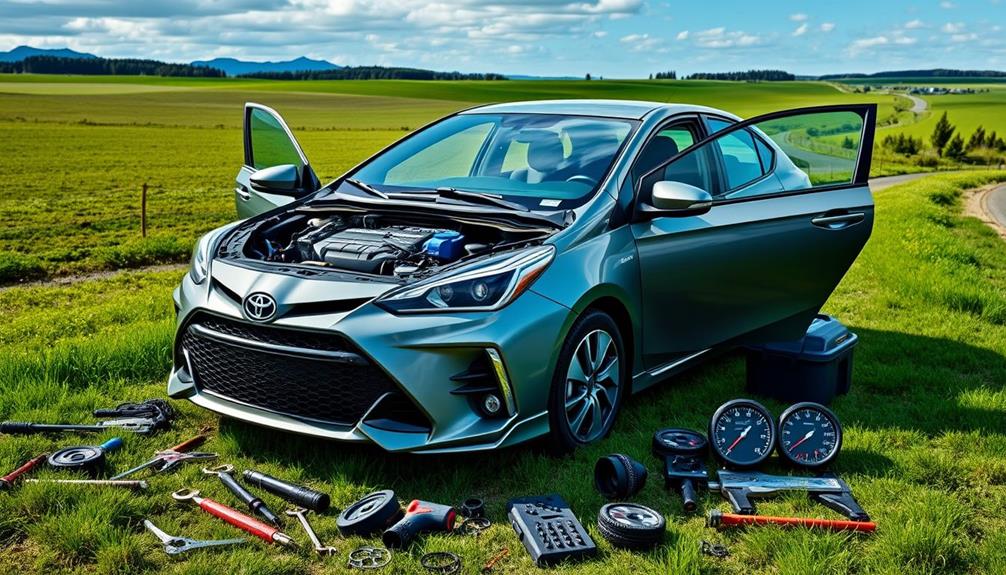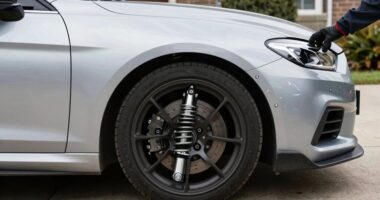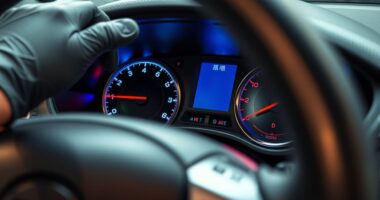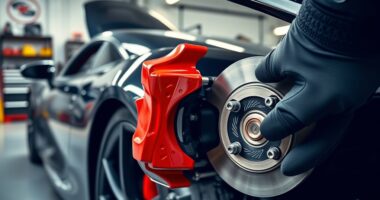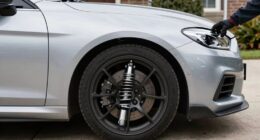Getting a car tune-up is essential for maintaining your vehicle's performance. First, gather your vehicle's service manual and any previous maintenance records. You should note any specific issues like strange noises or warning lights. During the appointment, expect services like replacing spark plugs, changing fluids, and inspecting belts. Mechanics will provide a detailed report on work done and future maintenance suggestions. Regular tune-ups can enhance fuel efficiency and prevent costly repairs down the line. Stay tuned for more details on what services you might need and how to maximize your vehicle's performance. To ensure your vehicle runs smoothly, it’s important to follow regular car maintenance tips. This includes checking tire pressure, monitoring oil levels, and scheduling regular inspections. By staying on top of these routine tasks, you can extend the life of your car and avoid unexpected breakdowns. Remember, a well-maintained car is a safer and more reliable one.
Key Takeaways
- Regular tune-ups enhance engine performance, fuel efficiency, and vehicle longevity by addressing minor issues before they escalate into costly repairs.
- Gather your vehicle's service manual, maintenance records, and document any performance concerns for discussion with the technician.
- Expect services like spark plug replacement, fluid changes, and inspection of belts and hoses to ensure optimal engine functionality.
- Prepare for a detailed service report summarizing the work done and future maintenance recommendations for your vehicle.
- Schedule tune-ups every 30,000 to 100,000 miles, depending on your vehicle's needs, to maintain peak performance and efficiency.
Understanding Tune-Ups
When it comes to keeping your car running smoothly, understanding tune-ups is crucial. A tune-up involves routine maintenance tasks designed to enhance engine performance and longevity. This typically includes replacing spark plugs, ignition wires, and filters. Regular tune-ups help prevent minor issues from becoming major repairs, ultimately improving fuel efficiency and your overall driving experience.
The frequency of tune-ups varies based on your vehicle make, model, age, and the manufacturer's recommended maintenance schedule. Generally, you should consider a tune-up every 30,000 to 100,000 miles. During a tune-up, key components like the ignition system, air filters, and fuel filters are inspected to verify they're functioning effectively.
Modern vehicles often utilize advanced technology, so tune-up procedures might differ from traditional practices. Nowadays, the focus is more on inspections rather than just component replacements.
Keeping up with these inspections and adhering to your maintenance schedule will greatly boost your car's performance efficiency. By understanding the importance of tune-ups, you're taking a proactive step in maintaining your vehicle and ensuring it runs at its best for years to come.
Key Components to Inspect
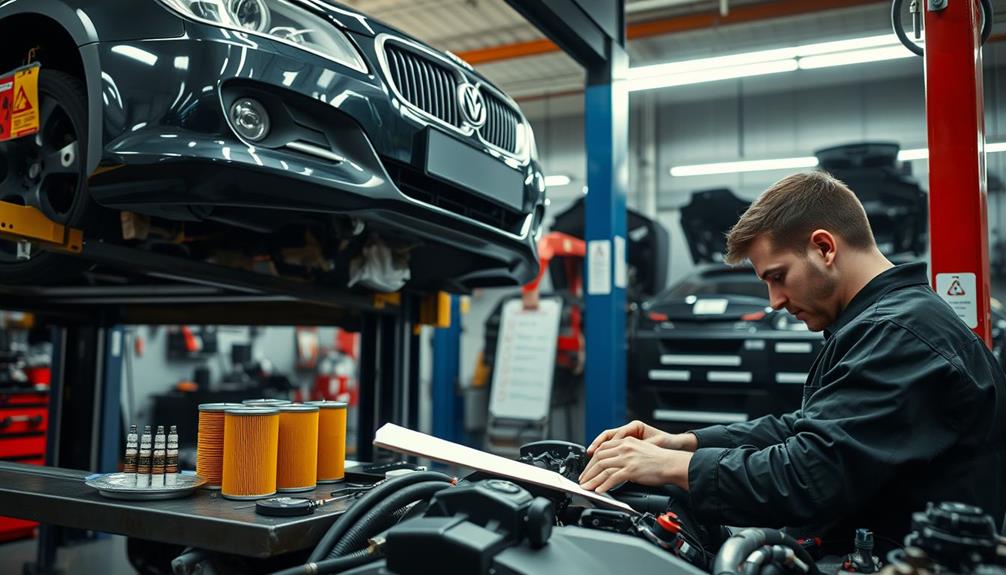
A thorough inspection of key components during a car tune-up is crucial for maintaining peak performance and preventing costly repairs. Here's what you should focus on:
| Component | Maintenance Tips |
|---|---|
| Spark Plugs | Replace if worn or misfiring (60,000-120,000 miles). |
| Ignition Wires | Check for fraying; faulty wires affect performance and fuel efficiency. |
| Air Filters | Replace every 15,000 miles for ideal airflow and engine performance. |
| Belts and Hoses | Inspect for cracks or leaks; replace timing belts every 80,000-100,000 miles. |
| Essential Fluids | Verify engine oil, brake fluid, and coolant are at proper levels and free from contamination. |
Importance of Regular Maintenance
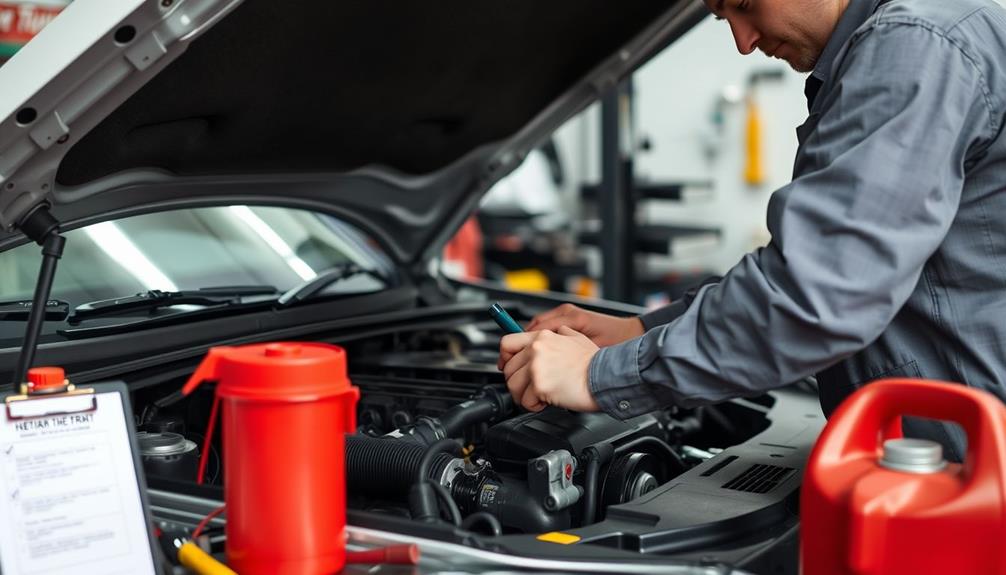
Regular maintenance isn't just about keeping your car running; it's essential for enhancing engine performance and ensuring your vehicle lasts longer.
By staying on top of tune-ups and routine checks, you can save money in the long run by preventing costly repairs and improving fuel efficiency.
Don't overlook the importance of keeping your car in top shape to enjoy a smoother, safer ride.
Engine Performance Enhancement
Engine performance enhancement hinges on the importance of regular maintenance. By keeping up with routine tune-ups, you can markedly boost your vehicle's efficiency and responsiveness.
Here are three key areas to focus on:
- Ignition System: Replacing spark plugs and ignition wires as recommended prevents misfires, guaranteeing peak engine performance and improved fuel efficiency.
- Filters: Maintaining clean air and fuel filters is essential. Contaminants can hinder engine performance, leading to sluggish acceleration and increased fuel consumption.
- Fluid Changes: Regularly changing motor oil and coolant can prevent excessive wear on engine components. This not only extends your vehicle's lifespan but also enhances overall performance.
During a tune-up, mechanics will adjust ignition timing, inspect belts and hoses, and perform necessary fluid changes. These steps are vital for preventing overheating and potential engine failure.
A well-maintained engine runs smoother, accelerates better, and delivers a more enjoyable driving experience. By prioritizing regular maintenance, you'll guarantee your vehicle operates at its best, ultimately saving you time and money in the long run.
Cost-Effective Preventative Care
Keeping your vehicle in top shape not only enhances performance but also saves you money in the long run. Regular preventative maintenance, like spark plug replacement and air filter changes, can boost your engine performance and fuel efficiency by up to 10%. This means fewer trips to the gas station and lower fuel costs over time.
When you follow manufacturer-recommended maintenance schedules, you can prevent minor issues from escalating into major repairs, potentially saving you an average of $1,200 annually.
Ignoring routine maintenance can lead to engine misfires and a significant drop in power, potentially decreasing fuel efficiency by 25%. Regular fluid changes and filter replacements, typically needed every 15,000 to 30,000 miles, are essential for maintaining vehicle health and preventing extensive engine wear.
Longevity of Vehicle Components
When you prioritize maintenance, you can greatly extend the lifespan of your vehicle's components. Regular tune-ups and inspections keep your car running smoothly, preventing costly repairs down the line.
Here are three key areas to focus on:
- Spark Plugs: Replace them every 60,000 to 120,000 miles. Old spark plugs can cause misfires, leading to engine damage and reduced performance.
- Fluid Levels: Regularly check and maintain fluid levels, including oil, brake fluid, and coolant. Changing engine oil every 3,000 to 7,500 miles helps keep your engine lubricated and reduces wear, enhancing overall longevity.
- Air Filters and Timing Belts: Change air filters every 15,000 miles to guarantee peak airflow and prevent contaminants from damaging your engine. Timing belts should be replaced every 80,000 to 100,000 miles to avoid catastrophic engine failure.
Preparing for Your Appointment
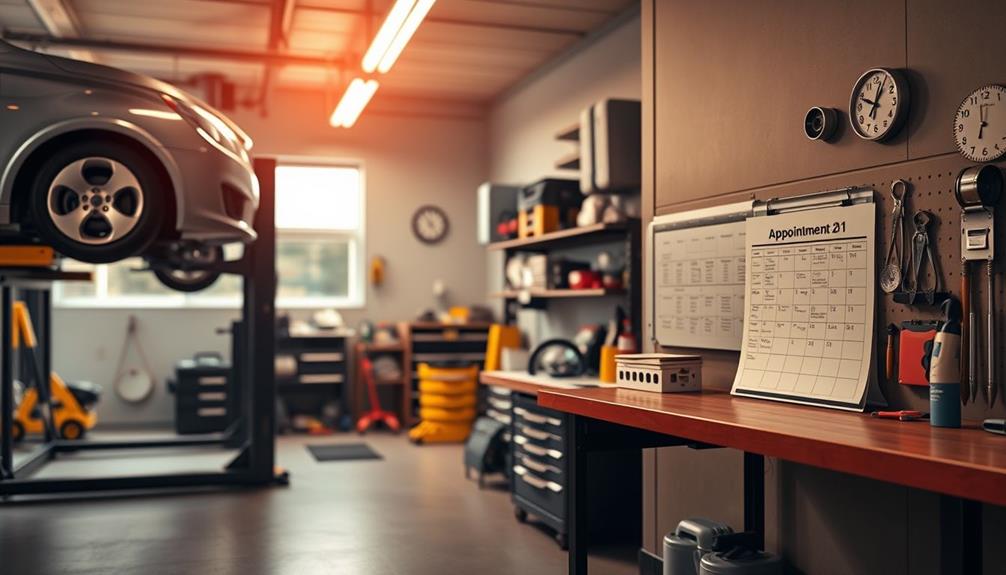
Before your appointment, gather your vehicle's service manual to check the recommended maintenance schedule.
It's also smart to note any specific concerns you've noticed, like strange noises or poor acceleration.
This info will help your technician address your vehicle's needs more effectively.
Gather Vehicle Information
Gathering your vehicle information is vital for a successful tune-up appointment. Before you head to the shop, make certain you've got all the necessary details at your fingertips. This not only helps the technician but also guarantees you get the best service.
Here's what to gather:
- Make, Model, and Year: Knowing these details will help the technician understand the specific needs of your vehicle.
- Current Mileage: This number is essential for determining the appropriate maintenance schedule.
- Owner's Manual and Service Records: Review your manual for maintenance schedules and any previous service history.
Additionally, be aware of any symptoms your vehicle has shown, such as engine misfires, rough idling, or warning lights on the dashboard. Jot these down to discuss during your appointment.
Also, if applicable, check for any manufacturer recalls or service bulletins related to your vehicle.
List Maintenance Concerns
It's important to list any maintenance concerns you have about your vehicle as you prepare for your appointment. This guarantees you and your technician can address all issues effectively. Here's a handy table to help you organize your thoughts:
| Concern | Description | Action Needed |
|---|---|---|
| Dashboard Warning Lights | Check for any illuminated lights | Discuss with technician |
| Unusual Noises | Listen for strange sounds | Mention specifics |
| Performance Issues | Note changes in fuel efficiency | Review maintenance schedule |
Before your tune-up, inspect for any unusual noises, rough idling, or difficulty starting, as these can indicate issues with engine components like spark plugs and wires/coil. Also, review your owner's manual for the maintenance schedule to guarantee you're covering necessary tune-up services.
Document any previous maintenance performed, as this will help the technician tailor their services to your vehicle's history. Prepare a list of recent performance changes, such as decreased fuel efficiency or stalling, to discuss during your appointment. Being organized will make the process smoother and more effective.
What to Expect During Service
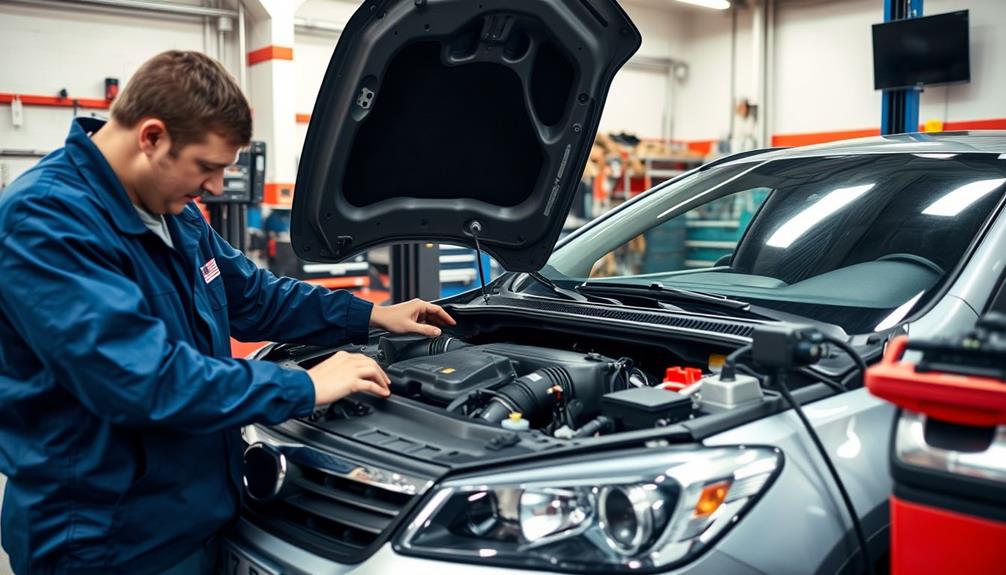
During a car tune-up, you can expect technicians to replace vital components like spark plugs, ignition wires, and air filters, all of which boost engine performance and fuel efficiency.
A thorough inspection of the ignition system is also standard practice. This includes checking timing and cleaning components like the throttle body.
Here's what you can anticipate during service:
- Fluid Changes: Expect changes to important fluids, such as engine oil, coolant, and brake fluid, to guarantee peak vehicle health and performance.
- Wear Assessment: Technicians will assess belts and hoses for signs of wear, which is essential to prevent potential engine damage.
- Service Report: After the tune-up, you'll receive a detailed service report summarizing the work done and offering maintenance recommendations based on your vehicle's specific needs.
Common Tune-Up Services Offered
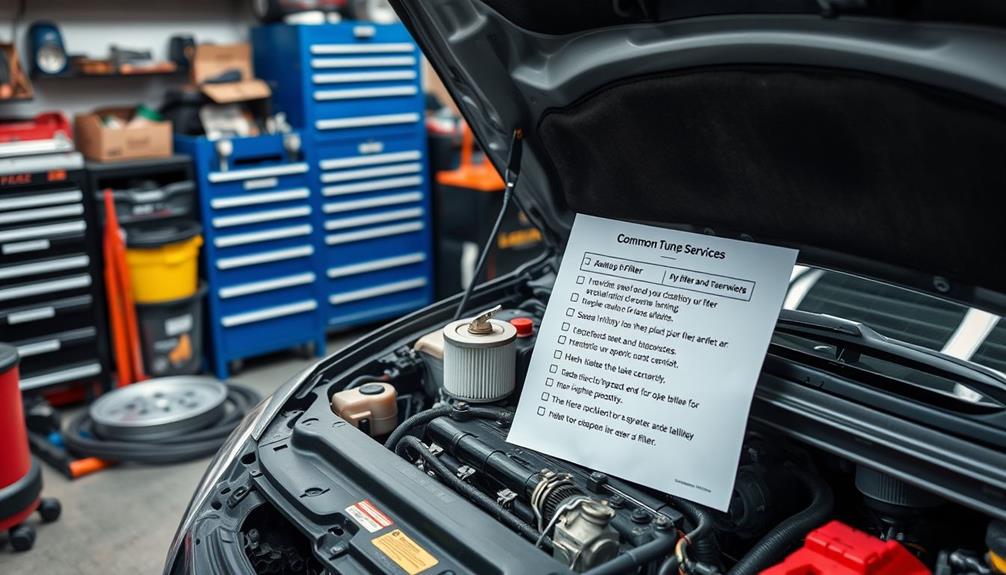
A car tune-up typically includes several essential services designed to enhance your vehicle's performance and longevity. One of the first tasks is the replacement of spark plugs and ignition wires, which are vital for peak engine performance and can greatly improve fuel efficiency.
You'll also see technician services like engine air filter and fuel filter replacements, guaranteeing clean airflow and fuel delivery to your engine.
Another common service is throttle body cleaning, which removes carbon buildup and boosts engine responsiveness and efficiency. If your vehicle has higher mileage, you might benefit from fuel system cleaning. This service maintains injector cleanliness, helping to keep overall engine performance in check.
Additionally, technicians may adjust ignition timing during a tune-up. This adjustment aligns with manufacturer specifications and verifies your engine runs smoothly and efficiently.
All of these services are part of routine maintenance, aiming to keep your vehicle in top shape. By addressing these components, you're setting the stage for enhanced engine performance and peak efficiency, making your ride more enjoyable and reliable.
Recognizing Signs of Trouble

Recognizing the signs that your car needs a tune-up can save you from more significant problems down the road. Keep an eye out for these critical indicators:
- Engine Misfires and Rough Idling: If you notice engine misfires or your vehicle's engine is idling roughly, it could signal worn spark plugs or ignition components that need replacing.
- Check Engine Light: If your check engine light illuminates, don't ignore it. This warning can indicate various issues, including problems related to ignition or fuel delivery, often requiring a tune-up.
- Performance Issues: Difficulty starting your car, slow acceleration, or poor overall performance are clear signs something's amiss. Unusual engine noises, like knocking or pinging, may also suggest issues with fuel mixture or ignition timing.
Addressing these symptoms promptly can help maintain your vehicle's fuel efficiency and overall reliability.
If you experience any of these signs, scheduling a tune-up should be a priority to prevent further complications and guarantee smooth driving.
Maintaining Vehicle Performance
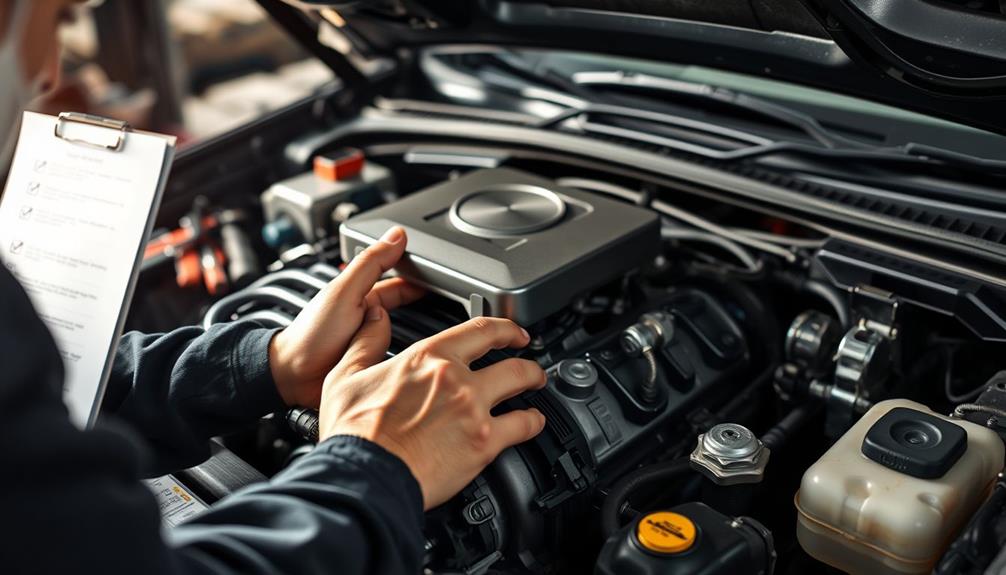
To keep your vehicle running at its best, regular maintenance is key. Routine inspections of spark plugs and ignition wires are essential. Worn spark plugs can cause misfires, markedly impacting your fuel efficiency. By replacing them promptly, you can enhance engine performance and potentially improve gas mileage by up to 10%.
Don't overlook your air filters, either. A dirty air filter restricts airflow, which can reduce engine performance and increase gas consumption by as much as 6-11%. Keeping them clean is critical for ideal vehicle operation.
Fluid changes, including engine oil and coolant, should be part of your regular maintenance routine. These changes prevent excessive wear and overheating, ensuring your vehicle runs smoothly over time.
Additionally, monitoring belts and hoses for signs of wear is imperative. A failed timing belt can lead to catastrophic engine damage, resulting in costly repairs.
Frequently Asked Questions
What Does a Car Tune up Include?
A car tune-up includes replacing spark plugs, ignition wires, and filters. You'll also have your throttle body cleaned, fuel system checked, and belts inspected. These steps enhance your engine's performance and overall vehicle efficiency.
What Is the Average Cost of a Full Tune-Up?
Think of a tune-up like a spa day for your car. On average, you'll spend between $100 and $300, depending on your vehicle's needs and whether you're opting for basic or extensive services.
What to Do Before Getting Car Tuned?
Before getting your car tuned, review the owner's manual for maintenance schedules, inspect spark plugs and fluids, note any symptoms, gather service records, and schedule your appointment when you can be without your vehicle for a few hours.
How Long Does a Tune-Up Usually Take?
Ever wondered how long a tune-up takes? Typically, it lasts between 1 to 3 hours. The exact time depends on your car's condition and the services needed, so check with your mechanic for specifics.
Conclusion
In the same way a musician tunes their instrument for a perfect performance, giving your car a tune-up guarantees it runs smoothly. Just like a guitar can sound off-key without proper adjustments, your vehicle can struggle without regular maintenance. By preparing for your appointment and understanding what to expect, you're setting the stage for a harmonious driving experience. So, treat your car to that tune-up—it'll thank you with better performance on every journey!

